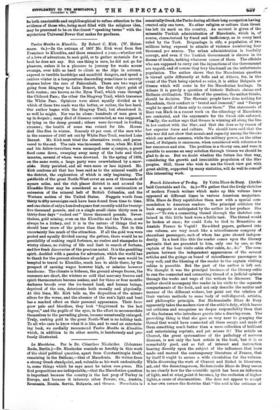La Macedoine. Par le Dr. Cleanthes Nicolaldes. (Johannes Rtede, Berlin.)—Dr.
Nicolaldes reminds us forcibly in this work of the chief political question, apart from Constantinople itself, remaining in the Balkans,—that of Macedonia. He writes from a strong Greek standpoint, and, valuable as his work undoubtedly is, some things which he says must be taken cum grano. His first propositions are indisputable,—that the Macedonian question is important because the country is the last prop of Turkey in Europe, and because it interests other Powers, viz., Austria, Roumania. Russia. Servia. Bulgaria. and Greece. Macedonia is
essentially Greek, the Turks during all their long occupation having created only one town. No other religion or culture than Greek has left its mark on the country, An account is given of the miserable Turkish administration of Macedonia, which is, of course, characterised by fraud and inefficiency, as in every land ruled by the Turk. Brigandage is rife, a population of two millions being exposed to attacks of violence numbering four thousand per annum. The urban administration is fearfully corrupt, and even if the Turkish Government is sincere in its dozens of irades, nothing whatever comes of them. The officials who are supposed to carry out the injunctions of the Government are unpaid, and of course they levy blackmail on the unfortunate population. The author shows that the Macedonian question is viewed quite differently at Sofia and at Athens, for, in the event of the Turk being ejected as ruler, it is either Bulgaria or Greece which will come in for the Macedonian heritage. In Athens it is purely a question of historic Hellenic claims and Hellenic civilisation. This side of the question, the author thinks, should be decisive. The Slavonic people have done nothing for Macedonia, their conduct is brutal and immoral," and " Europe ought to speak of them only to curse them." The statements of Herr von Mach in a recent work on the ethnology of Macedonia are contested, and the arguments for the Greek side enforced. Firefly, the author says that Greece is winning all along the line in her contest with the Slav, and that she does so by reason of her superior force and culture. We should have said that the late war did not show that morale and capacity among the Greeks which our author assumes, while the military power, on the other hand, of Bulgaria is enormous, when considered with reference to her resources and size. The problem is a thorny one, and were it possible to assume an easy solution through Greece we should be glad to do so. But we doubt whether the future lies that way, considering the growth and irresistible propulsion of the Slav peoples. Still, those who wish to see the Greek view put with great ability, supported by many statistics, will do well to consult this interesting work.






















































 Previous page
Previous page